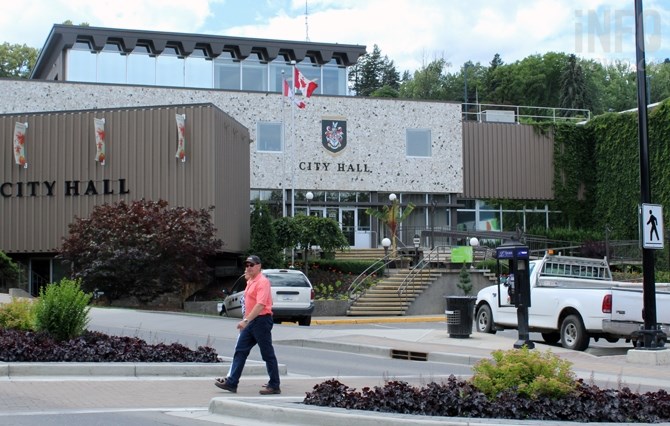
Kamloops city hall is pictured in this undated file photo.
Image Credit: FILE PHOTO
April 16, 2020 - 7:30 AM
While Vancouver Mayor Kennedy Steward mused about bankruptcy in his city in the face of the COVID-19 pandemic, it’s not the same kind of worry in the B.C. Interior's two largest cities.
“We’re a long way from bankruptcy,” Kamloops Mayor Ken Christian told iNFOnews.ca Tuesday, April 14.
“It all depends on how long this goes on,” Kelowna Mayor Colin Basran said. “I’m not going to say never.”
Kennedy made his comments last weekend in response to a poll that found half of Vancouver’s taxpayers didn’t expect to pay their full tax bill this year. He has since clarified his weekend comments, according to a Vancouver Sun report, but he didn't backtrack on how serious a financial problem it would be if that City's homeowners began defaulting on their property taxes.
Basran said he hasn't heard of similar sentiments being expressed in Kelowna.
One advantage for the Interior cities is that only about 35 per cent of their revenues come from taxes whereas Vancouver’s financial statements show that's were it gets about half its revenue.
What’s of greater concern for Interior mayors is a possible deferment of property taxes without other measures being taken.
Municipal taxes normally have to be paid around July 1 to avoid financial penalties.
But local governments also collect for regional districts, hospital boards and the B.C. Finance Authority. That money has to be forwarded to those bodies by the end of July. School taxes have to be forwarded by the end of August.
“We need to pay out the amounts that the regional district and others would get in full when not everyone has paid,” Basran said. “So, essentially, it’s the municipalities subsidizing other levels of government – in some cases it’s higher levels of governments when you’re talking about school districts which are run by the province. So, that’s a real problem for us.”
Both mayors join others in a weekly conference call with Minister of Municipal Affairs Selina Robinson and are trying to hammer home the point that, if municipal taxes are not collected fully or on time, then the other payment schedules also have to change.
The other issue is that municipalities cannot legally run deficits and rely on their big cash infusions from taxes once a year.
“If we were to defer the due date (for taxes) we have a cash flow issue in meeting our payroll,” Christian said. “If you don’t collect the taxes, you can’t pay the workers that do the public duties.”
And, while it might not mean bankruptcy, it could mean running a city that normally has 750 employees with 500, he said. That would be a very different looking city than it is today.
“We proposed something a bit more nuanced than simply deferring them,” Kamloops Mayor Christian said. “What we would like to see is some kind of incentive if you pay on July 2 and some kind of delayed penalty if you apply to have your taxes deferred because you’re out of work.”
In addition, he mused about whether a break should only go to residents or, maybe residents and small businesses.
Kamloops collects about $5.5 million in taxes from the Domtar pulp mill. The City has a bi-weekly payroll of about $2 million. Deferring Domtar’s tax bill would have a huge impact on the City’s cash flow.
All local governments are looking at ways to ease the pain and keep operating. Some have laid off staff, most are looking at cutting late payment charges for things like utility bills. Others are extending lines of credit and cutting programs and projects.
But, at some point, taxes have to be collected and the cities have to keep functioning. If they do it on lines of credit that’s got to come out of future taxes.
“Eventually, down the road, if you decide to keep people on because it’s the charitable and moral thing to do, in 2021 or 2022, the taxpayers of Kamloops are going to be asked to pay for that kind of charity,” Christian said, noting local governments aren’t eligible for wage subsidies from the federal government like businesses are.
Municipal budgets have to be set by the end of the month and they’re still waiting to hear back from the Robinson.
“The province keeps saying they’re working on it and will get back to us soon and we keep waiting,” Basran said.
To contact a reporter for this story, email Rob Munro or call 250-808-0143 or email the editor. You can also submit photos, videos or news tips to the newsroom and be entered to win a monthly prize draw.
We welcome your comments and opinions on our stories but play nice. We won't censor or delete comments unless they contain off-topic statements or links, unnecessary vulgarity, false facts, spam or obviously fake profiles. If you have any concerns about what you see in comments, email the editor in the link above.
News from © iNFOnews, 2020